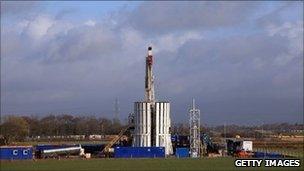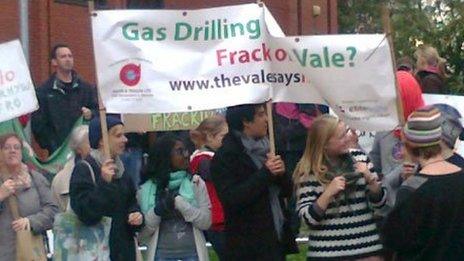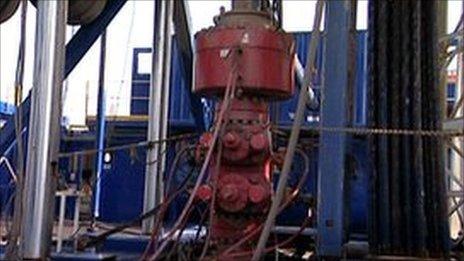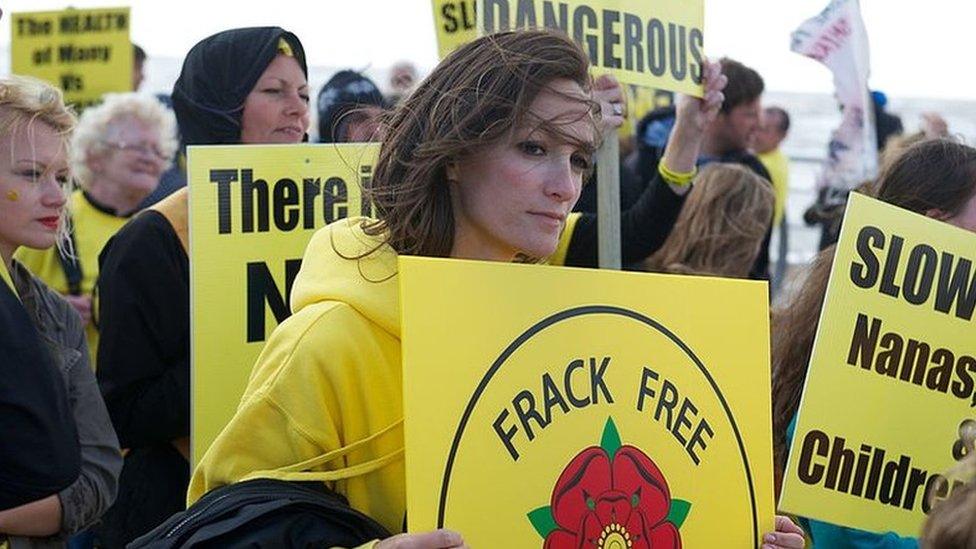Vale of Glamorgan fracking gas test drill background
- Published

Drilling for gas in Lancashire has been suspended due to earthquake concerns
If Vale of Glamorgan's planning committee decides on Thursday evening on the test drilling application by Coastal Oil and Gas (COG), it will infuriate many campaigners.
If it decides to defer, it may ask the Welsh government or the Department of Energy and Climate Change (DECC) for guidance. Then, will we see the same political verbal ping-pong between Cardiff and London as we've seen with the TAN8 wind energy policy?
At the pre-planning meeting Monday, it was made clear, again, that the application at Llandow is for exploratory drilling for conventional gas. It isn't for gas extraction.
A further application for any hydraulic fracturing or fracking of underground rocks to pipe shale gas to the surface would have to made in future.
The main concern voiced by campaigners is about potential water pollution.
According to a Dwr Cymru/Welsh Water official, only 5% of underground water is used by the company, however it is cautious of any potential risks, which may be low risk, but the contamination risk could be large if chemicals to extract the gas are used.
The concern by The Vale Says No campaign group, after scanning the internet is that potentially it claims, that between 30 and 70% of chemicals stay underground after fracking. Some of the chemicals used are also feared.
They also question how many jobs will be created, how much cheap gas in reality will be available as an energy source in Britain, and how many, or how few, will profit from prospecting shale gas or coal bed methane underground in Britain.
Lancashire experience
Also worth assessing is the role of the Environment Agency (EA). Currently no environment permit is needed, for fracking, if there was no risk to surface water (such as rivers) or water in the ground, including drinking water.
According to the EA, the dangers are the hazard of bore drilling, storage tanks if needed for extracted gas and within the fracking process if fluids enters ground water and pollutes it, and gas escapes. Which is why the EA are looking at the Lancashire experience of two tremors near fracking sites last summer.
Some argue that fracking isn't new in the UK, but what has changed in recent years making shale gas an attractive proposition for commercial companies, is that the technology has improved.
Now as well as drilling deep into the earth, it's possible to drill horizontally as well. That's why drilling has started in some areas of Britain, and that Coastal Oil and Gas (COG, with it's partner from Australia, Eden Energy, is keen to expand its exploratory drilling in south Wales. It also hold the licence to drill in Somerset and Kent.
The decision facing the Vale councillors is if there are any guarantees on possible impact. And after test drilling how long before the real drilling for shale gas starts?
Already we know, water would have to be trucked in, as there's no extraction licence in place yet, or a large enough river nearby Llandow to allow hydraulic fracturing miles underground.
Confident
And if the councillors plead ignorance and turn to the Welsh government and DECC for guidance, they can be sure that both officials and politicians will say they do possess enough facts and power already to make an informed decision.
If they vote to oppose test drilling, COG will appeal, and feels confident of winning that appeal.
One element that does bind everyone together apparently is that more legislation is needed, as in the words of Gerwyn Williams whose company is behind the planning application for Llandow: "At the moment we have to decide what's safe, and what isn't."
New legislation could get rid of such interpretation.
- Published20 October 2011

- Published29 September 2011

- Published26 September 2011

- Published31 July 2011

- Published1 July 2011

- Published1 June 2011
